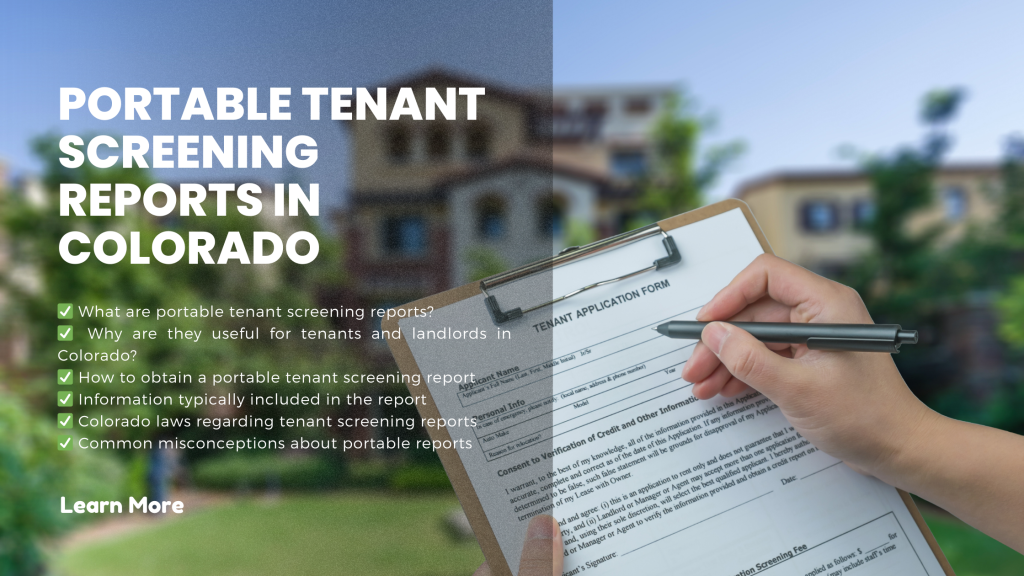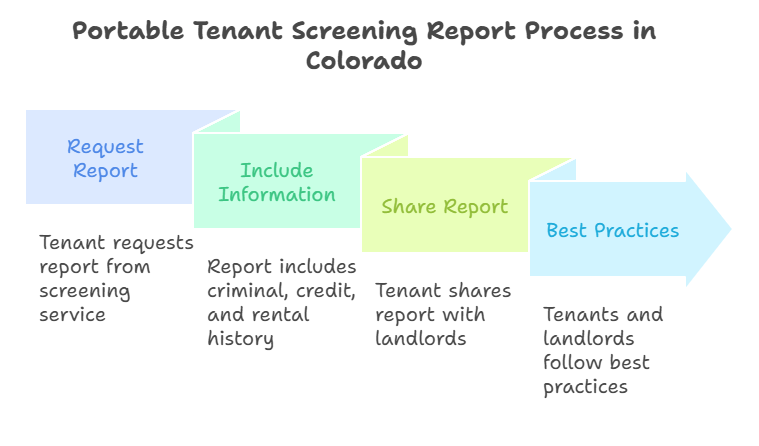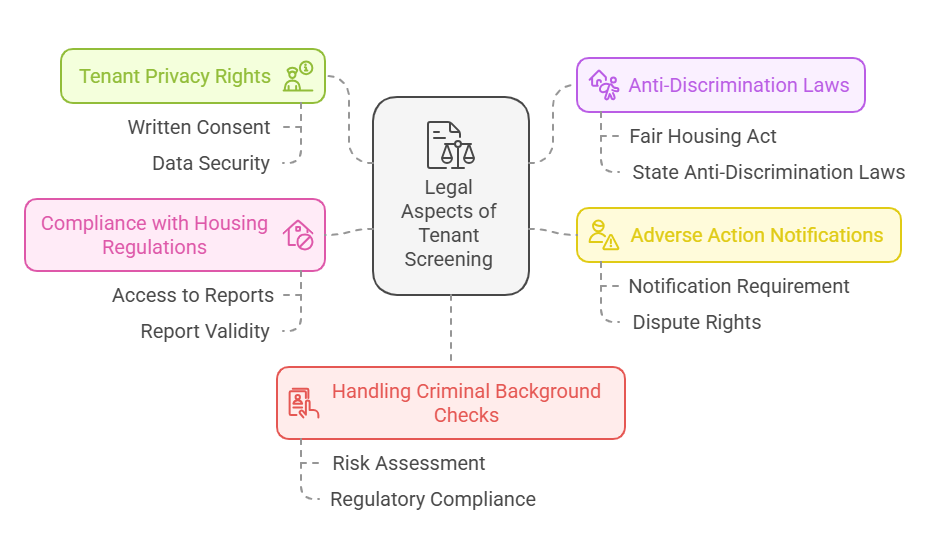Understanding Portable Tenant Screening Reports

Portable tenant screening reports are an essential tool in Colorado’s rental market. These reports allow tenants to carry their screening results with them when applying for rental properties, making it easier for landlords to access comprehensive information about a tenant’s history. This can include criminal background checks, credit history, and rental history. Portable tenant screening reports differ from traditional screening reports, as they are designed to be reusable and are typically requested by the tenant, rather than by the landlord. This gives tenants more control over how their information is shared, making the process more transparent and efficient.
For tenants in Colorado, these reports provide a way to demonstrate their reliability as renters, reducing the need for multiple screenings and ensuring a smooth application process with different landlords. On the landlord’s side, using portable reports helps them quickly assess a potential tenant’s suitability without the hassle of collecting and reviewing individual reports each time. These reports help to reduce delays in the rental application process and streamline decision-making for property owners.
By presenting a clear and comprehensive rental history to potential landlords, tenants can demonstrate their responsibility and reliability. As the rental market becomes more competitive, having a portable tenant screening report can be a key advantage for tenants seeking rental opportunities in Colorado.
How Portable Tenant Screening Reports Work in Colorado
Obtaining a portable tenant screening report in Colorado is a straightforward process that benefits both tenants and landlords. Here’s a step-by-step guide to understanding how portable tenant screening reports work and how to utilize them in the state.

Step 1: Requesting the Report
To obtain a portable tenant screening report, tenants must first request it from a trusted screening service. These services are typically offered by third-party companies that specialize in tenant background checks. A tenant can request a screening report for themselves, ensuring that it includes all the relevant information such as their criminal background, credit history, and rental history.
In Colorado, some companies provide a full package of information, giving tenants the ability to carry their screening results to any potential landlord. The process is usually fast and can be done online or by contacting a service provider directly.
Step 2: Information Included in a Portable Tenant Screening Report
A portable tenant screening report in Colorado typically includes the following information:
- Criminal Background: This includes any past criminal convictions, including felonies and misdemeanors, that may appear on the tenant’s record.
- Credit History: Landlords will often review a tenant’s credit score and history to assess their financial reliability.
- Rental History: This includes information on past rental agreements, payment history, and any issues that might have arisen with previous landlords, such as damages or eviction records.
These components help landlords assess the overall reliability of the tenant, ensuring they make informed decisions when renting out properties.
Step 3: Sharing the Report with Landlords
Once the tenant has obtained their portable tenant screening report, they can share it directly with landlords during the rental application process. This step is much easier than traditional methods, as the tenant controls the release of their own information. The report is often digital, so it can be shared via email or through a tenant screening platform.
Landlords can access this report quickly, saving time and reducing administrative work. It’s important for tenants to ensure that the report is up-to-date, accurate, and includes all necessary information for the landlord to make an informed decision.
Step 4: Best Practices for Tenants and Landlords
To ensure a smooth, secure, and legally compliant tenant screening process in Colorado, both tenants and landlords should follow best practices:
- For Tenants: Ensure that your report is complete and accurate before sharing it. Check for errors or outdated information that may affect your application.
- For Landlords: Be transparent about your tenant screening process and ensure that you are compliant with Colorado state laws regarding tenant privacy and discrimination.
Rapid Hire Solutions, for example, provides a streamlined service that helps both landlords and tenants manage their tenant screening efficiently. They offer support in creating and reviewing portable tenant screening reports, ensuring that all relevant information is properly included and accurate. Their services also help landlords maintain compliance with Colorado’s housing regulations, making the screening process faster and more secure.
Legal Aspects, FAQs, and Conclusion
Understanding the legal aspects of portable tenant screening reports is crucial for both tenants and landlords in Colorado. It ensures that the tenant screening process is fair, secure, and compliant with relevant laws. In this section, we’ll explore the legal implications, answer frequently asked questions, and summarize key takeaways.
Legal Aspects of Portable Tenant Screening Reports in Colorado

- Tenant Privacy Rights
Colorado has strict privacy laws that protect tenants’ personal information, including the data included in tenant screening reports. Under the Colorado Consumer Protection Act, tenants must give written consent before their background or credit information is accessed by third-party screening services. This consent ensures that the tenant’s personal data is handled securely and not used inappropriately. - Anti-Discrimination Laws
Landlords in Colorado are required to follow both state and federal anti-discrimination laws when evaluating tenant applications. The Fair Housing Act prohibits landlords from discriminating against tenants based on race, color, national origin, religion, sex, disability, or familial status. Additionally, Colorado has its own set of anti-discrimination laws that apply to housing, ensuring that the screening process is conducted fairly and without bias. - Adverse Action Notifications
If a landlord decides not to approve a tenant’s rental application based on the results of a portable tenant screening report, the landlord must provide the tenant with an adverse action notice. This notice must inform the tenant of the decision and explain the reasons behind it. If the screening report includes errors or incomplete information, tenants have the right to dispute the findings before the decision is finalized. - Compliance with Colorado Housing Regulations
In Colorado, landlords must ensure that the screening process complies with local regulations. This includes providing tenants with access to their own tenant screening reports upon request, as well as following state guidelines for how long reports are valid. For example, the reports should be current and reflect accurate, up-to-date information. - Handling Criminal Background Checks
When using criminal background information in tenant screening, landlords must be cautious not to violate any Colorado state regulations regarding how criminal history is used in housing decisions. For instance, landlords must not automatically disqualify applicants solely based on past criminal convictions unless they pose a legitimate risk to the safety and well-being of others.
FAQs about Portable Tenant Screening Reports in Colorado
What information is included in a portable tenant screening report?
A portable tenant screening report typically includes the tenant’s criminal background, credit history, rental history, and sometimes employment details. This helps landlords assess the tenant’s reliability.
How do I get a portable tenant screening report in Colorado?
Tenants can request a portable tenant screening report through reputable tenant screening agencies or online services. These reports are usually digital and can be shared directly with potential landlords.
Can a landlord refuse to rent based on a portable tenant screening report?
Yes, a landlord can refuse to rent to a tenant based on the findings in a portable tenant screening report, provided that the decision complies with anti-discrimination laws and that the tenant is informed through the appropriate adverse action process.
How long is a portable tenant screening report valid?
The validity of a portable tenant screening report can vary, but typically it is considered valid for 30 to 60 days. Tenants should ensure the report is up to date before sharing it with landlords.
Are portable tenant screening reports required by Colorado law?
No, portable tenant screening reports are not mandated by Colorado law, but they are highly encouraged as they provide an efficient, transparent, and secure way to conduct tenant screenings.
Conclusion
Portable tenant screening reports provide a streamlined and effective solution for both tenants and landlords in Colorado. These reports enable tenants to take control of their rental history and share it conveniently with potential landlords, while landlords can make faster, informed decisions based on the provided data.
By following the proper legal guidelines and ensuring transparency in the screening process, both parties can ensure a fair, secure, and compliant rental experience. Using services like Rapid Hire Solutions can further simplify the tenant screening process, helping both tenants and landlords navigate the complexities of background checks and tenant verification efficiently.
